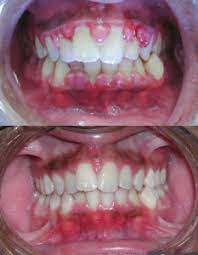
What Causes Gingivitis: A Comprehensive Guide
Gingivitis is an inflammation of the gums that can range from mild to severe. It is caused by a buildup of plaque on the teeth and gums, which allows bacteria to attack and irritate the surrounding tissue. This leads to redness, swelling and pain in the affected area. If left untreated, gingivitis can lead to the destruction of the bone and tissue that support the teeth, resulting in tooth loss. In this guide, we will explore the various causes of gingivitis and discuss preventive measures and tips for keeping your gums healthy. We’ll also provide answers to some of the most common questions about gingivitis and list local resources for those seeking additional help. By the end of this guide, you should have a better understanding of gingivitis, how it can be prevented, and what to do if it does occur. So let’s get started!
Poor Dental Hygiene – The Biggest Cause of Gingivitis
Poor dental hygiene is the number one cause of gingivitis. When plaque builds up on teeth, it creates an ideal environment for bacteria to thrive. This can result in swelling and inflammation of the gums.
Plaque is created when food particles mix with saliva to form a sticky film on teeth. If it’s not removed regularly, bacteria start to accumulate on teeth and below the gum line.
To properly remove plaque from teeth and keep gingivitis at bay, brush your teeth at least twice a day for two minutes each day. Make sure you are using a good quality toothbrush and use a fluoride toothpaste. Also, floss between your teeth at least once a day.
- Brush teeth at least twice a day for two minutes each
- Choose a good quality toothbrush and use fluoride toothpaste
- Floss between teeth at least once a day
It’s also important to visit your dentist at least twice a year or more often if recommended. A dental clean is essential to identify any areas of concern including plaque build-up and gingivitis before they become major problems.
Tobacco and Smoking
It’s no secret that smoking and tobacco use has numerous health risks, and gingivitis is among them. Tobacco users are prone to gum disease because the chemicals in smokeless tobacco and cigarettes can directly irritate the gums. In addition, the smoke from these sources reduces the blood supply to the gums, which can hinder the body’s ability to fight infections.
To make matters worse, people who smoke often tend to have less healthy oral hygiene habits than people who do not, as it can be difficult to brush away the unhealthy particles that cling to the teeth and gums. This poor hygiene further aggravates gingivitis, leading to more severe symptoms and more frequent recurrences of the disease.
Quitting smoking can help reduce your risk of gingivitis. If you are a smoker and are concerned with protecting your oral health, consider talking to your healthcare provider or dentist about ways to quit.

Cause #3: Certain Medications and Medical Conditions
Certain medications can cause an imbalance in the body that can lead to gingivitis. Medical conditions such as diabetes, HIV, and cancer can also contribute to gingivitis due to their effects on the immune system. Immune-suppressing medications, taken for conditions such as rheumatoid arthritis, lupus, and Crohn’s disease, can also put patients at risk for gingivitis.
In addition, some medications may cause dry mouth, which can increase the risk of developing gingivitis and other oral health issues. These include certain antidepressants, antihistamines, decongestants, and pain relievers. It is important to talk to your doctor or dentist if you are experiencing any dry mouth symptoms and make sure you are following an appropriate dental hygiene routine.
It is also important to note that some medical conditions can cause chronic inflammation and can make it more difficult for the body to heal itself, resulting in an increased risk of gingivitis. Examples of these include diabetes, leukemia, HIV, and certain autoimmune diseases, such as rheumatoid arthritis.
If you are taking any medications or have any medical conditions, be sure to talk to your doctor or dentist about your risk factors for gingivitis. Proper oral hygiene and regular dental care can help reduce your risk of developing this condition.
Cause #4: Lack of Dietary Nutrition
It isn’t just brushing and flossing your teeth that is important for healthy gums; what you eat can also play a role. Having a poor diet—with little to no fruits, vegetables, or even protein—can lead to gum disease, because malnutrition impairs the body’s natural defensive mechanisms, like saliva, which helps keep the mouth clean. If you’re not getting enough of the right nutrients, your gums may be more prone to infection and inflammation, including gingivitis.
Without enough vitamin C, for example, gingivitis might become worse because this vitamin is essential for healthy gum tissue and preventing inflammation. Studies have shown that when people with gingivitis began taking vitamin C supplements their gums improved significantly. Other vitamins and minerals that are beneficial for preventing gingivitis include calcium, iron, zinc, and folic acid.
A deficiency in many of these vitamins and minerals can lead to an increase in bacteria, which can then cause inflammation and tenderness in the gums, leading to gingivitis. Eating foods rich in these vitamins and minerals—such as broccoli, spinach, and yogurt—can help prevent gingivitis, as well as eating a balanced diet overall.
Gingivitis is an inflammation of the gums caused by poor oral hygiene, smoking, certain medications and medical conditions and a lack of dietary nutrition. It may lead to tooth decay, gum disease, and other serious health problems. It is important to take preventative measures to reduce your risk of gingivitis, such as brushing and flossing every day, avoiding tobacco use, eating a balanced diet, and visiting the dentist regularly. Taking these steps will help keep your gums healthy and reduce your risk of developing gingivitis. To wrap up, it’s important to maintain good oral hygiene habits and visit your dentist regularly in order to reduce your risk of developing gingivitis. Eating a balanced diet, avoiding tobacco use, and taking certain medications as prescribed can also help reduce your chances of developing this condition. In addition, if you have any questions or concerns about gingivitis, don’t hesitate to reach out to a local dental professional. With the right resources, knowledge, and care, gingivitis is something that can be prevented and avoided.

Preventing Gingivitis
Gingivitis is an infection and inflammation of the gums that can lead to more serious dental problems if left untreated. It is important to take preventative measures to lower the risk of developing gingivitis. Here are a few steps you can take to help protect your gums from this condition.
Brush and Floss Daily
Brush your teeth twice daily and floss once per day to remove plaque, bacteria, and other debris that can build up in the spaces between teeth and along the gum line. Make sure to brush and floss gently so as not to damage or irritate the gum tissue.
Use an Antibacterial Mouthwash
Antibacterial mouthwashes help to reduce the levels of oral bacteria that can cause gingivitis. Rinsing with a mouthwash twice a day helps to remove food particles and other debris from the teeth, cheeks, tongue, and gums and reduce the risk of gingivitis.
Healthy Diet and Lifestyle Habits
Eating a healthy diet and avoiding smoking and tobacco products can help to improve your overall oral health and reduce your risk for gingivitis. Try to limit sugary foods and drinks and replace them with healthier options like fruits, vegetables, and whole grains.
Regular Dental Visits
Visiting your dentist regularly for regular cleanings and check ups is one of the easiest and most effective ways to prevent gingivitis. Your dentist can help identify any potential dental problems and provide treatment if needed. It’s also a good idea to ask your dentist about any preventative measures you can take to reduce your risk of gingivitis.
Prevention Tips
Gingivitis is a condition that can be prevented with good dental hygiene. While it can sometimes occur as a result of certain medical conditions, drugs, or nutrition, there are several things you can do to reduce your chances of getting gingivitis:
- Brush your teeth twice a day with a soft-bristled toothbrush and fluoride toothpaste
- Floss your teeth at least once a day
- Visit your dentist regularly for checkups and cleanings
- Quit smoking and limit exposure to other forms of tobacco
- Eat a balanced diet high in fruits and vegetables
- Use dental products that contain antibacterial ingredients to kill bacteria
By following the prevention tips listed above, you can help keep your mouth healthy and reduce your risk of developing gingivitis.
Q&A: Common questions about Gingivitis
Gingivitis is a common condition that affects the gums. It can lead to irritation and pain, and if left untreated, can cause severe damage to your overall dental health. Here are some common questions people have about gingivitis and its causes.
- What is the difference between gingivitis and periodontal disease?
Gingivitis is an early form of gum disease that can be easily treated with good oral hygiene. Periodontal disease is an advanced form of gum disease which is irreversible, causing loss of teeth and tissue. It is important to catch gingivitis early to prevent it from becoming periodontal disease. - What causes gingivitis?
Poor dental hygiene, tobacco use, certain medications and medical conditions, and inadequate dietary nutrition can all contribute to the development of gingivitis. - What are the symptoms of gingivitis?
Symptoms of gingivitis include irritated gums that are red, swollen, and painful. Bleeding gums when brushing or flossing may also occur. If you notice any of these symptoms, please contact your dentist right away. - How is gingivitis treated?
Treatment for gingivitis depends on the severity of the condition. In mild cases, regular brushing and flossing, along with an antiseptic mouthwash, can help treat the infection. More severe cases may require medication or even surgery.
Local Resources for Help With Gingivitis
If you’re looking for help with your gingivitis, there are many qualified dentists and clinics in your local area that can provide treatment and advice. Whether you’re looking for a general dentist, specialist, or dental surgeon, the options available to you are vast.
Finding a provider near you is easy. A great starting point is to visit your local dental association website to find a list of certified practising dentists. Your family doctor may also be able to recommend a qualified dentist in your area.
Most dental insurance plans cover at least some of the costs associated with treating gingivitis. You may need to speak with your insurer to understand your coverage and see if there are any limits or exclusions.
If you require more specialised care for your gingivitis, there are some clinics which offer specific treatments for this condition. For example, there are clinics available that offer laser treatments and other specialised procedures. You will need to inform your dentist or doctor if you are considering any such treatments.
Finally, for those who do not have access to health insurance or adequate funds to cover medical bills, there are numerous free clinics and charitable organisations throughout the United States that can provide assistance. Charitable foundations like the American Red Cross, United Way and Catholic Charities are excellent resources for finding help with your gingivitis.
Further Reading
For readers looking to learn more about what causes gingivitis, there is a wide array of reading material available. Here are a few recommended sources:
- Gingivitis: Causes and Prevention, an informational article from Cleveland Clinic
- What Causes Gingivitis?, an article from Colgate Professional
- Gingivitis: What Is It and How Do You Prevent It?, an informational article from WebMD
- Gingivitis, an overview from MedlinePlus
This guide is only intended to provide a basic overview of what causes gingivitis. For more detailed information, or assistance with preventing or treating gingivitis, readers should consult with their dentist or other healthcare professional.
Summary and Closing Remarks
Gingivitis is a common problem that affects many people. It is caused by a number of factors including poor oral hygiene, tobacco and smoking, certain medications, and lack of dietary nutrition. To prevent and treat gingivitis, it is important to practice good oral hygiene and visit your dentist regularly. Additionally, it may be necessary to adjust your lifestyle, diet and medications in order to protect your gums from the damaging effects of gingivitis.
It is important to remember that the best way to reduce your risk for gingivitis is to practice excellent dental hygiene each day and visit your dentist on a regular basis. If you are having any signs or symptoms of gingivitis or if you feel like your gum health needs to be monitored, contact your dentist. Taking care of your teeth will help you to enjoy a healthier, more comfortable smile.
We hope that this guide has provided you with the information you need to understand the causes, preventative measures, and treatment options available when it comes to gingivitis. Your oral health is important, so make sure to take the right steps to keep your gums healthy and strong.
What Causes Gingivitis?
- Q: What is gingivitis?
A: Gingivitis is a common gum problem and it occurs when the gums become swollen, red, and sore. It may also cause bleeding when brushing teeth. - Q: What are the primary causes of gingivitis?
A: The primary causes of gingivitis include poor dental hygiene, tobacco and smoking, certain medications and medical conditions, and lack of dietary nutrition. - Q: How can I prevent gingivitis?
A: You can prevent gingivitis by practicing good dental hygiene, not using tobacco and making healthier lifestyle choices, carefully monitoring any medications you may be taking, and improving your dietary nutrition. - Q: What are some additional tips to prevent gingivitis?
A: Additional tips to prevent gingivitis include regularly visiting your dentist for checkups and cleanings, brushing twice a day, flossing daily, gargling with antibacterial mouthwash, and avoiding certain foods and drinks that can damage your teeth or gums. - Q: Where can I find help near me for gingivitis?
A: You can find help for gingivitis by searching for local dentists and clinics in your area – you can use online directories and search engines to find information about different dentists, as well as reviews from other patients who have visited them. - Q: What further reading can I find about gingivitis?
A: You can find further reading about gingivitis by doing research online, checking out your local library, or talking to your dentist. Additionally, there are many websites, books, and articles that have valuable information and advice. - Q: What should I do if I suspect I have gingivitis?
A: If you suspect you have gingivitis, the best thing to do is contact your dentist right away – they can diagnose whether you have gingivitis, then provide treatment and prevention advice accordingly.
